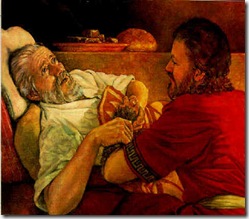That might sound like an odd question. I admit that before today, I rarely have thought of my suffering as anyone else’s but mine.  I pull it around me like a wooly shawl and wallow, wallow, wallow–pretty sure that nobody knows the trouble I’ve seen!  Today, as I pondered afresh the implications of 2 Corinthians 1, I felt as though God had switched on a big “ah-ha” light bulb concerning the topic of who owns my suffering. In verses 3-11 Paul writes:
 Blessed be the God and Father of our Lord Jesus Christ, the Father of mercies and God of all comfort,  who comforts us in all our affliction, so that we may be able to comfort those who are in any affliction, with the comfort with which we ourselves are comforted by God.  For as we share abundantly in Christ’s sufferings, so through Christ we share abundantly in comfort too.  If we are afflicted, it is for your comfort and salvation; and if we are comforted, it is for your comfort, which you experience when you patiently endure the same sufferings that we suffer.  Our hope for you is unshaken, for we know that as you share in our sufferings, you will also share in our comfort.
Blessed be the God and Father of our Lord Jesus Christ, the Father of mercies and God of all comfort,  who comforts us in all our affliction, so that we may be able to comfort those who are in any affliction, with the comfort with which we ourselves are comforted by God.  For as we share abundantly in Christ’s sufferings, so through Christ we share abundantly in comfort too.  If we are afflicted, it is for your comfort and salvation; and if we are comforted, it is for your comfort, which you experience when you patiently endure the same sufferings that we suffer.  Our hope for you is unshaken, for we know that as you share in our sufferings, you will also share in our comfort.
For we do not want you to be ignorant, brothers, of the affliction we experienced in Asia. For we were so utterly burdened beyond our strength that we despaired of life itself.  Indeed, we felt that we had received the sentence of death. But that was to make us rely not on ourselves but on God who raises the dead.  He delivered us from such a deadly peril, and he will deliver us. On him we have set our hope that he will deliver us again. You also must help us by prayer, so that many will give thanks on our behalf for the blessing granted us through the prayers of many. (2 Corinthians 2:3-11)
It is comforting that Paul doesn’t want me to remain ignorant on this topic!  His words teach me that:
- Suffering is not an aberration of nature to be avoided at all costs, it is part of God’s intentional plan. The plan’s purpose is twofold: first, so that I can be engaged with the personal touch of God, a treasured aspect of His character — His comfort.
- Without suffering, I would miss this experience of God; after all, we don’t need comfort if we aren’t hurting.
- The second part of the plan’s purpose is to wean me from self-reliance and grow me in God dependence.
- The pattern for understanding my suffering comes from understanding the purposeful suffering of Christ that ended triumphantly in the resurrection.
- The comfort that I receive from God is not intended to end in a cul-de-sac in my life but is meant to be shared–poured out in the lives of others who are suffering.
The new thought today came from the phrase, “as we share abundantly in Christ’s sufferings”. That verse suggests that suffering as a Christian is not a solitary experience. Our unity with Christ is so total that our suffering is described as being shared and as belonging to Christ.
“Perhaps it is easier to recognize that our blessings belong to the Lord than it is to recognize that he owns our suffering. If you watch someone suffer, you will see that we tend to treat suffering as something that belongs to us, something we can respond to as we please. We tend to turn in on ourselves. Our world shrinks to the size of our pain. We want little more than release, and we tend to be irritable and demanding.
It does not take long to learn that suffering brings you power. As you cry in pain, people run to help you. They offer you physical comfort, say nice things, and release you from our duties…A whole host of self-absorbed temptations greet us when we treat suffering as something that belongs to us. This passage reminds us that our suffering belongs to the Lord. It is an instrument of his purpose in us and for others. The way we suffer must put Christ on center stage. The Redeemer owns our disappointment and fear. He owns our physical and spiritual pain. He owns those crushing past experiences. He owns our rejections and aloneness. He owns our dashed expectations and broken dreams. It all belongs to him for his purpose. When we feel like dying, he calls us to a greater death. He calls us to die to our suffering so that we may live for him.
This is not a call to some creepy form of Christian stoicism. It is a call to bring the full range of our suffering to Him. We are to weep loudly and mourn fully before him, knowing that true comfort can only be found at his feet. We are to place our mourning in his hands to be used for his purposes in our lives and the lives of others. And it is a promise of comfort from the God who is the source of it all.” ((Paul David Tripp, Instruments in the Redeemer’s Hands, p. 153-4))
Today, I am grateful to be in a family where suffering is not wasted but is purposefully directed toward receiving and giving comfort! What a relief to be freed from owning my suffering–what a privilege to know it is shared with the Lord Jesus.
 When rereading the familiar Genesis 27 story of Jacob’s attempt to steal the firstborn blessing from Isaac, I was struck with how clearly Scripture portrays the fervor and futility of self will.
When rereading the familiar Genesis 27 story of Jacob’s attempt to steal the firstborn blessing from Isaac, I was struck with how clearly Scripture portrays the fervor and futility of self will.
